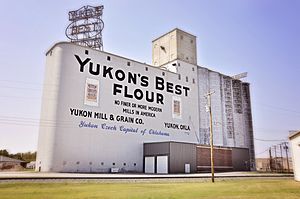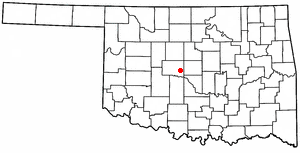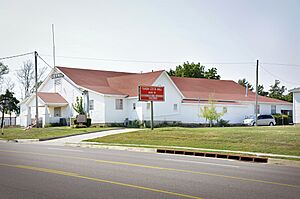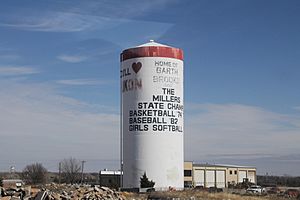Yukon, Oklahoma facts for kids
Quick facts for kids
Yukon, Oklahoma
|
|
|---|---|

Yukon's Best Flour mill, located on U.S. Route 66
|
|

Location of Yukon, Oklahoma
|
|
| Country | United States |
| State | Oklahoma |
| County | Canadian |
| Government | |
| • Type | Council-Manager Government |
| Area | |
| • Total | 26.60 sq mi (68.89 km2) |
| • Land | 26.54 sq mi (68.74 km2) |
| • Water | 0.06 sq mi (0.15 km2) |
| Elevation | 1,273 ft (388 m) |
| Population
(2020)
|
|
| • Total | 23,630 |
| • Density | 890.35/sq mi (343.76/km2) |
| Time zone | UTC−6 (Central (CST)) |
| • Summer (DST) | UTC−5 (CDT) |
| ZIP codes |
73085, 73099
|
| Area code(s) | 405 |
| FIPS code | 40-82950 |
| GNIS feature ID | 2412327 |
Yukon is a city located in the eastern part of Canadian County, Oklahoma, in the United States. In 2020, about 23,630 people lived there.
The city was started in the 1890s. It got its name from a gold rush happening at the time in the Yukon Territory in Canada. Long ago, Yukon was a busy place for local farmers and had a big flour mill. Today, many people who work in the Oklahoma City Metropolitan Area live in Yukon.
Contents
History of Yukon: How the City Began
Yukon was founded by A.N. Spencer in 1891. He named it after the Yukon River, which flows through British Columbia, the Yukon Territory, and into Alaska.
Spencer was a cattleman from Texas who became a railroad builder. He was building a train line from El Reno to Arkansas. He decided to create a town along the way. On February 14, 1891, Spencer officially set up the townsite. He made a deal to lay train tracks through the town. In return, he would get half of the land lots. These lots were owned by Minnie Taylor and Luther S. Morrison, who got the land in the 1889 land run. Spencer also bought more land south of Main Street from Joseph Carson and his sister, Josephine. Spencer and his brother, Lewis, named the town after the Yukon Territory in Canada. A gold rush was happening there, making it famous.
The first homes and shops were built on the north side of Spencer Avenue (now Main Street). They were mostly around what are now Fourth and Fifth streets. On April 1, 1891, a local newspaper, the Canadian County Courier, reported on the new city. It said Yukon had 25 homes, a bank, two real estate offices, two restaurants, a lumber yard, a hardware store, a grocery, a place for horses (livery stable), two saloons, a blacksmith shop, a printing office, and two barber shops.
The Choctaw, Oklahoma and Gulf Railway Company built its tracks through Yukon. This caused another nearby town called Frisco, which had 1,000 people, to be left behind. Around 1898, people from Bohemia started moving to Yukon. After World War I, Bohemia became part of Czechoslovakia and Moravia. So, these immigrants became known as "Czechs." Because of this, Yukon is known as the "Czech Capital of Oklahoma."
In 1901, the town decided to become an official city. In 1910, they voted to add water systems, sewers, and electricity from the mill. Businesses stayed mostly on Main Street between Fourth and Fifth streets. But in the 1920s, they started to spread out to other parts of town. An electric train line, called an interurban, was built from Oklahoma City to El Reno in 1911. It stopped running in 1940. Paved roads didn't come to Yukon until State Highway 66 was built in 1926.
Yukon grew as a central place for farmers in the area. It had an organized library by 1905 and its own library building in 1927. A small flour mill, the Yukon Mill and Grain Company, opened in 1893. By 1915, it had grown so much that it was shipping flour and animal feed all over the southern U.S. and even overseas. The Kroutil and Dobry families owned the mill. But in the 1930s, the Dobry family built their own mill and separated from the Kroutils. Later, bigger companies bought both mills. Shawnee Mills bought the Yukon Mill and Grain Company, and Mid-Continent bought the Dobry Mills. To honor this history, the students of Yukon High School are called "Millers," and their mascot is "The Miller Man."
In 1949, Yukon got national attention because of Grady the Cow. She was stuck inside a silo for four days!
Yukon's population grew from 830 people in 1907 to 1,990 by 1950. By 1960, it reached 3,076. In the 1960s, Oklahoma City took over almost all the land around Yukon. This led to a big increase in new homes and businesses. By 2005, the town had grown to about 22,000 residents.
Geography and Location of Yukon
Yukon is located in the east-central part of Canadian County. The western edge of Oklahoma City is about 3.5 miles east of Yukon's center.
The city has famous roads like Route 66 and state highways 4 and 92 running through it. It is also just north of Interstate 40. Downtown Oklahoma City is about 16 miles to the east.
The United States Census Bureau says that Yukon covers a total area of about 68.1 square kilometers. Most of this (67.9 square kilometers) is land, and a small part (0.1 square kilometers) is water.
Population and People of Yukon
| Historical population | |||
|---|---|---|---|
| Census | Pop. | %± | |
| 1910 | 1,018 | — | |
| 1920 | 1,016 | −0.2% | |
| 1930 | 1,455 | 43.2% | |
| 1940 | 1,660 | 14.1% | |
| 1950 | 1,990 | 19.9% | |
| 1960 | 3,076 | 54.6% | |
| 1970 | 8,411 | 173.4% | |
| 1980 | 17,112 | 103.4% | |
| 1990 | 20,935 | 22.3% | |
| 2000 | 21,043 | 0.5% | |
| 2010 | 22,709 | 7.9% | |
| 2020 | 23,630 | 4.1% | |
| 2022 (est.) | 25,556 | 12.5% | |
| U.S. Decennial Census | |||
In 2010, there were 22,709 people living in Yukon. There were 8,744 households and 6,390 families. The city had about 880 people per square mile. There were 9,231 homes, with about 315.8 homes per square mile.
The people living in Yukon were mostly White (87.8%). There were also African American (1.2%), Native American (3.7%), Asian (2%), and Pacific Islander (0.1%) residents. About 1.5% were from other races, and 3.7% were from two or more races. People who identified as Hispanic or Latino made up 4.9% of the population.
Out of the 8,744 households, 38.2% had children under 18 living with them. About 59.6% were married couples living together. About 10.9% had a female head of household with no husband present. And 26.4% were not families. About 21% of households had single people living alone. About 9.2% of households had people 65 years or older living alone. The average household had 2.57 people, and the average family had 2.97 people.
The population was spread out by age. About 26.2% were under 18 years old. About 59.9% were between 18 and 64 years old. And 13.9% were 65 years or older. The average age was 37.7 years. About 52.8% of the population was female, and 47.2% was male.
The average income for a household in the city was $59,803. For a family, the average income was $66,635. Men earned about $49,836, while women earned about $34,717. About 6.5% of families and 8.5% of the total population lived below the poverty line.
Arts and Culture in Yukon
The Czech Hall is a special place in Yukon. It is a national and state historic site. Its goal is to keep Czech traditions, history, and culture alive.
Yukon hosts several fun community events:
- The Czech Festival happens on the first Saturday of October.
- The Chisholm Trail and Crawfish Festival takes place on the first Saturday of June.
- In late August, Yukon also has a country music festival called "Rock the Route."
Education in Yukon Schools
The Yukon Public Schools district covers most of Yukon. It has 11 schools and serves a community of about 36,938 people. The district covers 66.10 square miles of land and 2.18 square miles of water. It offers education from pre-school all the way through high school. In the 2017–2018 school year, the schools served 8,781 students.
Some parts of Yukon are also in the school districts for Banner Public School and Riverside Public School.
Yukon High School has won many state championships in sports:
- Softball: 1986, 1991, 1997, 2000, and 2010.
- Boys Basketball: 1974 and 1979.
- Baseball: 1982, 1996, and 1997.
- Cheerleading: 2002.
Notable People from Yukon
Many interesting people have connections to Yukon:
- Joe Albertson: He started the Albertsons grocery store chain. He was born in Yukon.
- Dan Bailey: A football kicker for Oklahoma State University and the Dallas Cowboys.
- Phil Ball: A former football coach at UCO.
- Garth Brooks: A famous country music singer who grew up in Yukon.
- Josh Shipp: A motivational speaker who grew up in Yukon.
- Brad Dalke: A golfer born in Yukon.
- Max Gleason: A YouTube musician known as "Smooth McGroove" who sings a cappella.
- Steve Heller: A writer who was raised near Yukon.
- Cross Canadian Ragweed: A band that was started in Yukon.
- Ed Roberts: A poet and author born in Yukon.
- Dale Robertson: An actor who starred in films and TV shows like Tales of Wells Fargo and Dynasty.
See also
 In Spanish: Yukon (Oklahoma) para niños
In Spanish: Yukon (Oklahoma) para niños
 | Kyle Baker |
 | Joseph Yoakum |
 | Laura Wheeler Waring |
 | Henry Ossawa Tanner |



